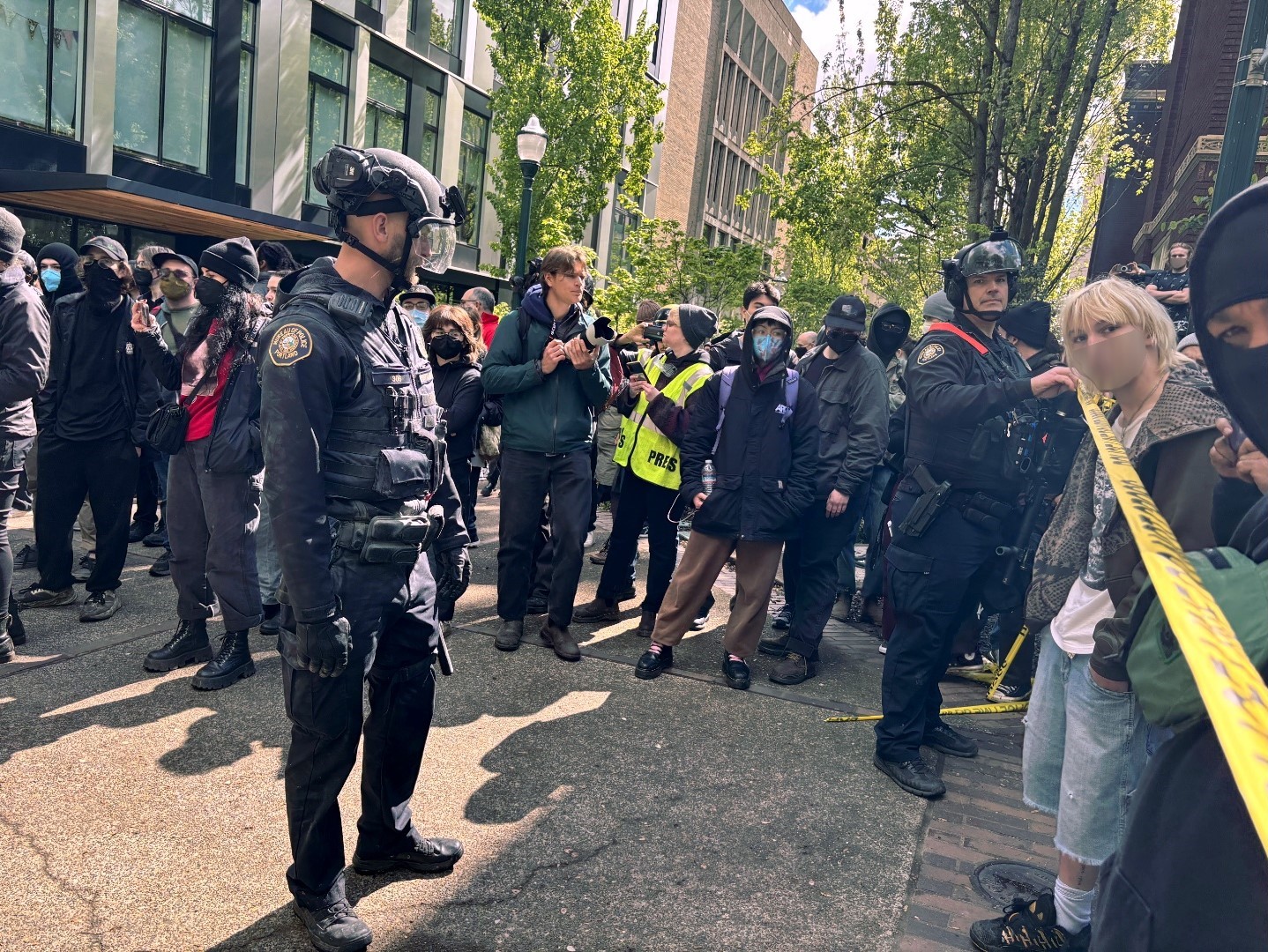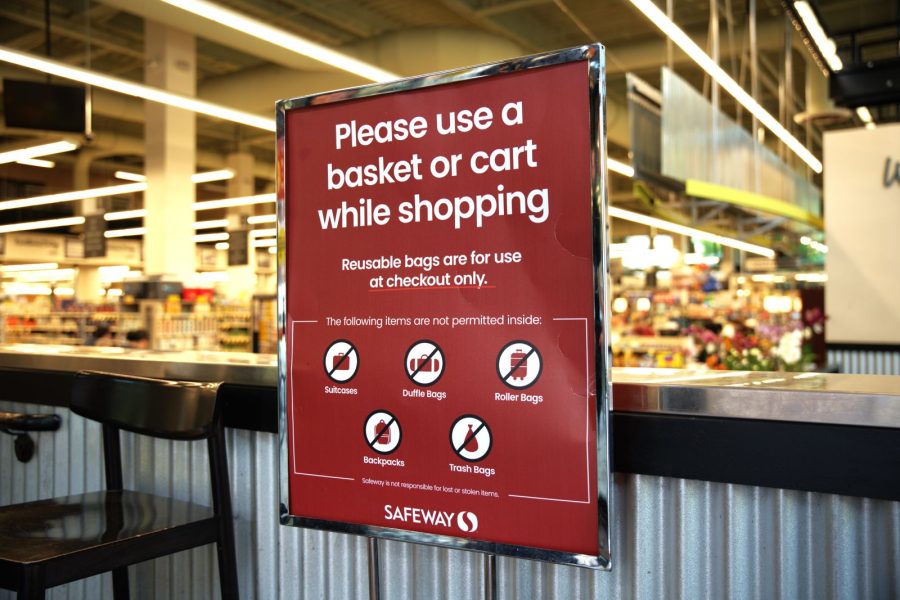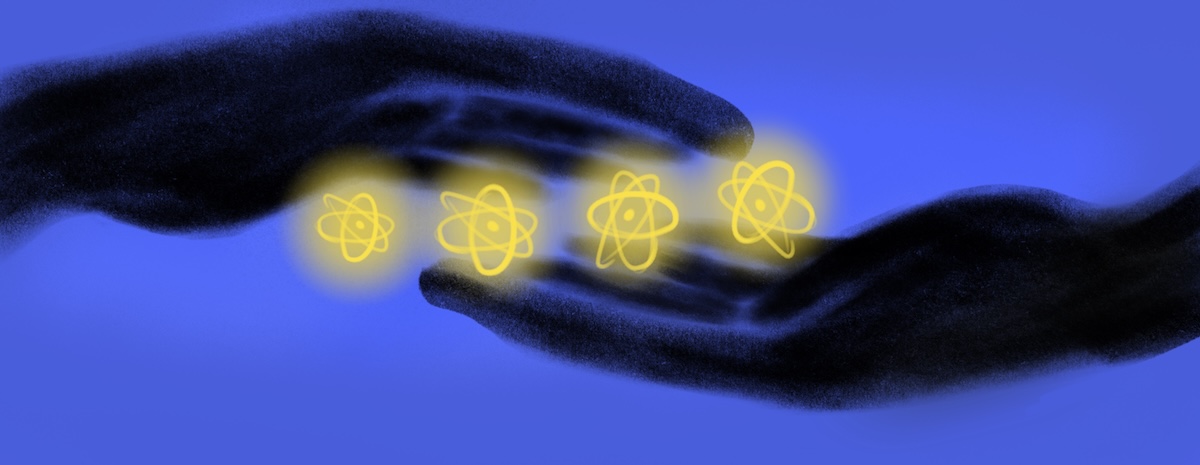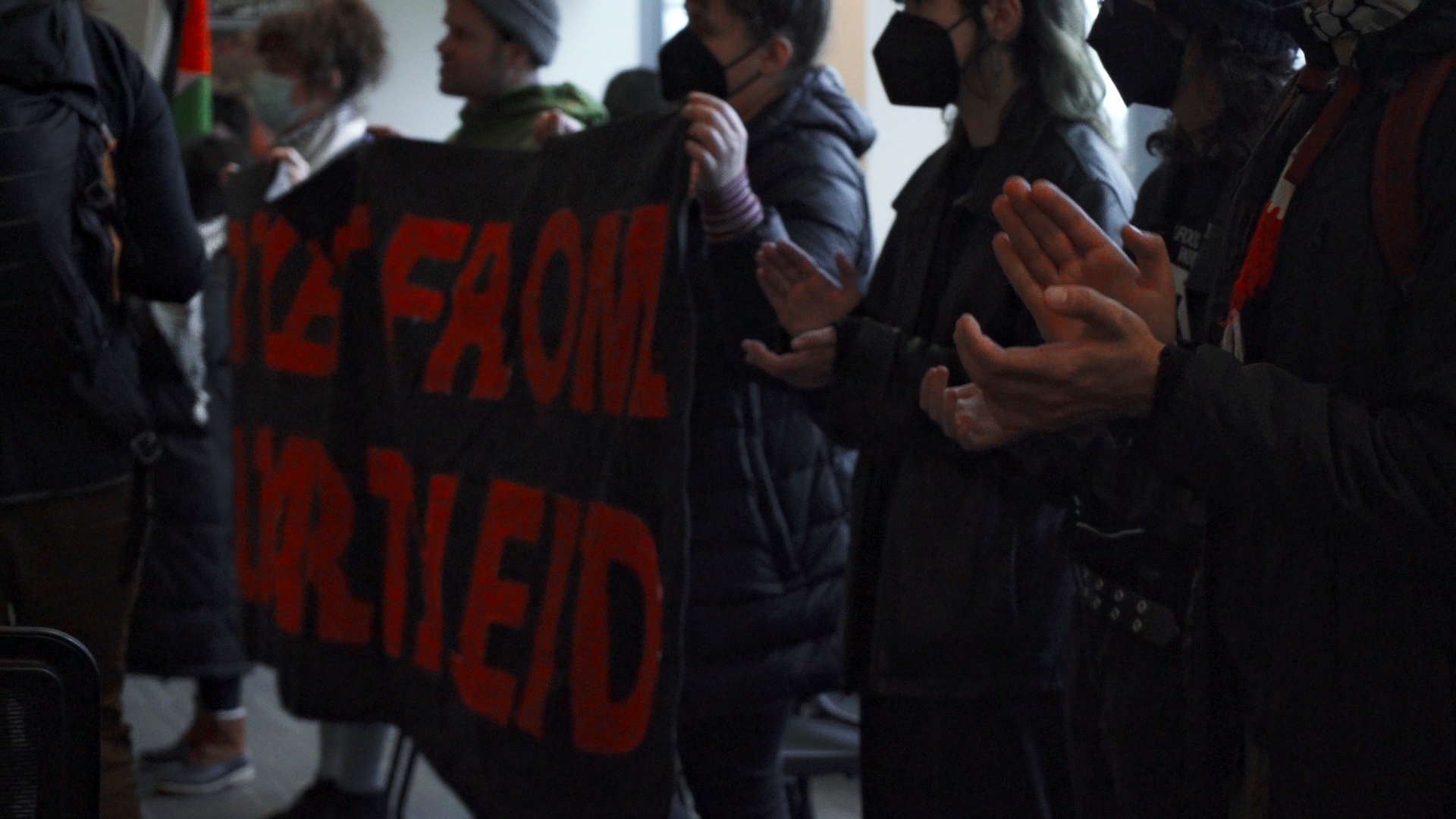This piece is part of an issue with a content warning regarding police violence. For a full acknowledgement of the content warning and source anonymity, please visit our article: About this special issue.
As journalists and editors, we are often behind the scenes—a voice on a video or a name on a byline and nothing else. This week, we felt it was important to be more. While we are journalists, we are also students, and seeing the events that unfolded in our community impacted us all differently. As journalists, we are first observers, reporters, distanced and unemotional and unbiased, but as students, when something like this happens in our community around us, it’s hard to be fully that. This is a place for us to recognize that impact on us as journalists and as students to live in that dichotomy of being both.
Isaiah Burns – Vanguard contributor
The support we’ve gotten from the community has been so overwhelming. I can’t help but start by expressing my gratitude to the people who make up this university. Without all of you tuning in and sharing your thoughts, all the hours we put in, the people we spoke to, the sacrifices we made, and the risks we took, that would have all been for nothing.
Secondly, none of this would have been possible without such an incredible team. Over the few days that the occupation lasted, I have seen so much commitment, passion and bravery from my team members. Belonging to this posse of Vanguard has become a validating and inspiring experience that I’ll carry with me.
I’m not here to share my personal beliefs about all of this, I don’t think that’s the responsibility I have. All I’ll say is that you can never truly understand a situation until you’re on the ground witnessing it, speaking to the people who are part of it. The truth is a difficult thing to harness, and those with the largest platforms tend to be the ones with the reins.
J.M. Vincent—Vanguard contributor
On a Monday, I walked past a crowd gathered at the library. I craned my neck as I went, taking a long time to stare. Someone in a beanie and a black mask waved. I waved back, and then they continued moving supplies into the barricaded portico.
Before leaving, I slipped my laptop into my desk, like I do most days, not having the foresight to consider what may come or that campus may close. It did close. I got the message the next morning, a Tuesday. I naively thought that I—a graduate student with a faculty badge—could still access the buildings so that I could retrieve my laptop to attend my now-virtual classes. But when I arrive, I am locked out. All of us are, faculty included.
With nothing else to do, I went to the library. There, among the barricades and protesters who’ve now entered and occupied the library, I found several Vanguard reporters whom I don’t recognize. I introduced myself to Liam, who would soon become the face of the Vanguard Breaking News feed. He’s young. It was his first week on the job, thrown into something he had no time to mull over. All the better. We would need someone earnest and recognizable. It doesn’t hurt that he’s charming, pleasant-looking and has an air of innocence one might take for candor or trustworthiness.
With him was Sergio, Vanguard’s Multimedia Editor who, I’d learn, is anybody’s friend. A Peruvian who speaks perfect English despite only having lived here several years, Sergio is more fixer than editor—working on the sidelines and waiting for a call, always saying yes to any request, and managing to follow through on any task handed to him.
Isaiah walked up and introduced himself. He’s just as capable and charming as the others. Anyone could see that Isaiah will end up in some far-off country as an on-the-ground war correspondent or something like it. He knows it, too. This job here is just a stepping stone, but he takes it seriously.
They began talking to a protester who went by the name James. James was the de facto spokesperson who stood outside the now-occupied library. I joined them, taking over the interview. I gently grilled James on the messaging, the timelines, and the demands. He pushed back without pause, offering responses I’m guessing he hasn’t had to give yet.
He said that the occupied space was open to all community members. I said that it was before.
He told me they were trying to create an inclusive space that prioritized students.
He pointed to the second floor, where I saw a couple of non-protesters studying at some tables by the windows.
“Do they know that it’s illegal to be in there?” I asked.
He said it’d be totally irresponsible of us to withhold that information. Referred me to a sign that forewarned all who entered.
I left campus for several hours, unsure if I’d be back. But as I sat at home, I felt compelled to get up and go. I arrived around 5 p.m. to find Sergio, Liam and Isaiah making Breaking News videos. Our Instagram was apparently blowing up. At 6 p.m., Campus Public Safety Officers came to tell the protesters that this was an “illegal and unlawful gathering” and that it was “time to go.”
They laughed.
Officers handed them a flimsy, typo-filled slip of paper and then walked away. One of the protesters yelled, ‘we’re locking it down! Anyone that wants to go inside, do it now. It’s your last chance.’ But that never ended up happening. Instead, word spread that they had 12 hours before the cops came. I hadn’t planned on staying late, but felt I couldn’t leave the other reporters.
“Y’all ever been tear-gassed before?” I asked. They looked around at each other, all said no. I told them that it’s not so bad, but that they won’t be able to see or breathe. I finished by imploring them not to get arrested.
Alyssa, one of the News Editors, arrived then. Alyssa’s got a no-bullshit attitude that acts as a guiding light for all of us, particularly the younger reporters. But she’s also maddeningly sarcastic and funny, which gets everybody off their guard. A couple of other non-Vanguard friends joined the pack. One of them is Colin, an architecture student and a future reporter for Vanguard. He keeped close, particularly to me. I learned quickly that I could trust him, so began asking him to assist in tasks. After a while, he began intuiting the needs of the group and, at times, acting as an emotional support.
In the following hours, as the night grew deeper, community members gathered for several events put on by the protesters—a movie and an open mic. Our group had several huddles where we laid out game plans and predictions. We were sure that the cops were coming. Our guess was between 1–2 a.m., similar to when they evicted the protesters from the South Park Blocks a couple of nights ago. But it got later and slower. I told myself I’d leave within the hour, stay just long enough to help report on the cops coming. 12 a.m., 1 a.m., 2 a.m., 3 a.m. Nothing. We sat around chain-smoking, looking toward streetlight-lit corners for any sign of the police. The birds began to sing around 4 a.m. A protester brought me a coffee. We all paced in silence. Most of the reporters left. Alyssa and I stayed. The sun broke when we finally decided to call it. I got in bed around 7:30 a.m., just as the city began its day. I managed two hours of sleep and a few wild dreams before I threw some dirty clothes on and headed back to the library.
Liam Schmitt—Vanguard contributor
My experience with the protest was the most peculiar time of my life. I had been covering the protest on and off since Friday, April 26, but on Monday, when the library occupation began, my life began to be consumed with this story. I spent as much of my day as possible there, only really leaving to eat. I would sometimes find the time to sleep, but I would only sleep a few hours a night. I would stay out as long as possible, from sundown to sunrise. My main concern was being there to tell the story; I didn’t want to miss anything. I wanted everyone to have a voice and feel heard. I never felt unsafe throughout the week, and the support and feedback from the community made all of the sleepless nights and long hours worth it. I was happy that people felt heard.
JJ Christensen—Vanguard contributor
I feel that the violence that took place was the fault of the campus administration. In the months leading up to the occupation of the Branford Price Millar Library, the demands of students who called for a divestment from companies such as Boeing were not engaged with.
They were met with a stonewall from the Administration, who never touched on or commented on the demands even as the number of student groups who supported them grew. It would be a lie to say this series of events has not made me infinitely more angry at my campus administration than I was before.
To deny your role and your power as a university to contribute to lasting peace in the Levant and Palestine feels insane to me. I am outraged as a student. I am outraged as a journalist who was put at risk during my coverage of the events. I am outraged as a Christian who is principally against the wielding of power against the dispossessed, and I am outraged as a human being capable of empathy.
Sergio Cervantes—Vanguard Multimedia Editor
Cold nights, long waits, hunger, and insecurity. What happened? What did I experience? A young student who loves photography and videography only has one job to do. Capture unique moments that may never happen again. Or will they? On Thursday night, April 25, I received a message from my PSU Vanguard team asking me to go to the Branford Price Millar Library at PSU to take some pictures of what was happening. I never imagined that that night would be the first of many.
In the first few days, I began to neglect my diet as I listened to the protesters shouting “Free! Free! Palestine!” They were very friendly and always offered me a bottle of water so I wouldn’t dehydrate. What I liked most was that they loved PSU Vanguard and only trusted us, which encouraged us to continue reporting everything that was happening in the library.
On May 1, I woke up at 3 a.m. to meet again with my PSU Vanguard colleagues outside the library. They looked very tired, just like me, with only four hours of sleep. The night was cold and quiet, so I decided to take out my laptop and start doing homework that I had been procrastinating on. I stayed until 8 a.m. and then went home to sleep a little more.
The days passed, and the situation began to escalate. I knew that anything could happen at any moment. I knew things could get out of control. And so it was. In my head, everything had happened so fast. The protesters entered the library, the police tackled them, and a person with mental illness attempted to run over all the students and members of PSU Vanguard. It was a very strong and desperate situation, but there I was, capturing every moment that no one was expecting to happen.
The circumstances were catastrophic, but my love for photography and videography was infinite. I was there from the beginning to its end. I saw unjust arrests, people getting sprayed with mace and strong shoving. The ones who were supposed to defend us were betraying us. Shocking? Not really. I think we have already become accustomed to injustice and lies.
Me? I am just a simple Peruvian immigrant with an immense love for filmmaking. Me? I just have faith that this world will be a better place tomorrow. Thanks for the opportunity, PSU Vanguard.
Alley Henrici—Vanguard Online and Promotions Editor
When I finally got home for the night after a long week of classes as a graduate student—our team at Vanguard got wind of an encampment being set up and a possible dispersal order given. I had just made dinner with my partner when this was sent. I ate quickly and headed to the scene of the first Palestine solidarity encampment on Thursday, April 25.
This sense of being summoned to action at a moment’s notice became the norm over the next few days. I spent the entirety of Friday, April 26, watching South Park Blocks for indications of police presence and protesters. I met some professional journalists who had finally heard of the situation.
While I was on the ground, the protesters were extremely kind to us, offering water and meals to us as we sat and observed everything that took place. I even got the honor of witnessing a Jewish Shabbat ceremony on the steps of the library, after which each person who participated and observed was offered matzah. Overall, being on the ground felt immensely important to document the events that took place on campus. I’m grateful for the firsthand experience and the ability to report the truth about the events rather than what biased media sources promote as truth when they were not even present.
I decided to take a step back after the first weekend, especially once it seemed that the PSU administration, the police, and the encampment had come to some sort of temporary agreement to coexist, which, of course, changed after the protesters took the library Monday. While I stayed largely off the scene, I continued to work behind the scenes managing our social media accounts.
I have never seen so much support and hatred simultaneously on our account from both locals and beyond. I could not help but recognize a recurring pattern—people, for better or worse, wrongly associated us with the protest.
We are student journalists reporting on campus happenings for our fellow students. While we had hoped the hatred would be kept online, a person who had commented other rude messages on our videos posted a story, reading “OMW @PSUVANGUARD [middle finger emoji]” over a picture of them driving a car. This, of course, is the individual who drove their car into the park blocks during the ongoing standoff between protesters and the police on Thursday, May 2.
Again, among this hatred was also support from our community, offering endless gratitude for being on the ground and keeping the public up to date with the ongoing protests. It inspired hope in me that people not only were aware that these updates were journalistic in nature but also cared for fellow human beings rather than advocating for violence against our journalist team and the protesters alike. Ultimately, reporting on this protest reinforced my wishes for empathy and understanding between all people.
Alyssa Anderson—Vanguard News Editor
The days leading up to the original encampment on the park blocks were fueled by anxiety. Watching videos from Columbia, University of Texas at Austin and other colleges around the country, I knew something was bound to happen at PSU. Having gotten to know the community of Portland-area activists during previous protests, I knew they were likely planning something. I knew they were not the type to go down without a fight, no matter the consequences.
Even before the first tent went up, I felt something brewing on campus. There was a palpable aura of discontent, anger and despair—likely a side-effect of the long months most of us spent watching a genocide unfold on our phone screens. When the encampment was built and destroyed all in one day, my anxiety began to swell. The next day, when the group moved to occupy the library’s portico, my sense of unease all but doubled. By the time the protesters had broken into the library, I was consumed by dread and an almost unbearable sense of responsibility. My anxiety, however, had nothing to do with the protest itself but instead revolved entirely around the knowledge that the police could show up at any minute. I knew they would not be gentle.
After a few long nights spent out in the cold rain outside the library, I got used to the idea of the police raid in the distance. I got comfortable and grew to enjoy my time, getting to know my reporters and co-mingling with the protesters and community members who showed up in solidarity.
Despite the anxiety, I will look back on those nights fondly for years to come. The group at the library was a peaceful, interesting and supportive crowd of people from all walks of life. I grew closer to the reporters I had before and only communicated with them over Slack. I couldn’t bear the thought of any one of these people getting hurt.
As student journalists, we were woefully unprepared, with only two press vests and the majority of our equipment locked inside our office. As an editor, I felt responsible for the safety of all of my reporters—especially the younger ones. I found myself constantly imagining worst-case scenarios and making plans on how I would handle it if one of my reporters somehow got arrested or injured. None of these plans prepared me for what actually happened.
Once President Ann Cudd announced that the campus would be open on Thursday, May 2, I truly didn’t know what to believe. Up until then, school had been closed every night of the encampment. We all figured Cudd would never call the police when uninvolved students or members of the public were around—we all thought it would happen in the dead of night.
Nevertheless, after two uneasy hours of sleep, I awoke to a phone call at 6 a.m. I jumped out of bed, threw on my clothes and ran to the library. Despite the anxiety that had been festering within me over the last week, I felt eerily calm when I arrived on the scene. There was no time to be scared, no time to worry about anything but documenting the truth.
I knew what I had to do. And I did it the best I could.
The police raid and everything that happened after is a blur. I remember the protesters running out of the library to applause and cheers. I remember trying to dodge caution tape that kept getting moved. I remember seeing a student get arrested for leaving their dorm.
But, most importantly, I remember the police. Their blank stares as they pointed guns filled with paintballs toward a crowd of college students. The way they lined up in front of us like a murder squad, looking for any excuse to use brute force.
I remember rounding a corner only to be met with the agonizing screams of my peers who had been pepper sprayed or knocked to the ground. I remember watching a police van drive towards a crowd of people whose average age couldn’t have been more than 21. I remember thinking I was going to see someone get badly injured or killed. I remember holding a friend of mine as he sobbed and asked me, “how could they do this to us?” I remember learning that a man drove into a crowd of protesters, specifically trying to target Vanguard reporters.
Despite all of this, the thing I will take away from this whole ordeal is the wonderful, liberating sense of community I felt at the encampment. The camaraderie among myself and the rest of Vanguard’s staff, the way we supported and encouraged each other, and the way the protesters cared for us like family, giving us what little food they could spare, are some things that will never leave me.
Community is a powerful, unbreakable force. No matter how dark our world becomes, community will always prevail.
Zoë Buhrmaster—Vanguard News Editor
I didn’t expect I’d be staying the night when I showed up to the library Wednesday morning. In fact, I came not in my capacity as an editor for Vanguard that day but as a freelancer for The Oregonian, merely collecting a couple of sources with thoughts on the ongoing protests.
I showed up on the scene and, seeing Kat and Cameron sitting on a bench, caught up with them on the events of the day. I left, coming back later, again fighting the natural instinct of hanging out with my team when I needed to be sourcing for a different organization.
I finished sourcing for The Oregonian and, in the process, realized that if there was a time to be a student journalist, it was now. Our team’s relationship to the community, our understanding of campus, and our ability to commit our entire newsroom to the coverage allowed us the unique opportunity to offer in-depth, community-centered perspectives.
Tides became tipsy as we all attempted to balance our regular course load of homework and other jobs, sleep and food. No one was really getting paid, or at least very little, for what they were doing—the sleepless nights and round-the-clock coverage. It’s a hobby, if you can call it that.
We also lacked resources—without access to our newsroom throughout the duration, we shared two press vests and two cameras with people running back to the dorms for battery packs. Not only that, but at a university without a journalism program or journalism-specific advisor, we were going in very minimally trained on what to do and how best to cover situations like the protests and occupations.
In a student newsroom where editors meet in person once a week and remote contributors most often only meet you face to face in their interviews and hardly ever each other, the 24/7 coverage cultivated newfound familiarity and appreciation. I felt grateful to be a part of such a passionate team.
The following 30 hours on campus after that Wednesday morning are now somewhat of a blur. As I reflect, I remember small details. Medics checked in on our team as we sat in front of Fariborz Maseeh Hall, offering us water bottles and face masks. Beholden sentiments for the Subway on campus staying open for 24 hours. The solitary sound of birds chirping at 5 a.m. as the sun rose, shortly before the convoy of police arrived.
Of all the things I have covered as a student journalist and editor over the past four years, the Palestine protests have garnered some of the strongest thoughts and opinions from across the spectrum. As journalists, it’s our responsibility to maintain neutrality while uplifting the voices of those who are not heard. To that effect, I am proud of the team for what we were able to do despite the hurdles and incredibly grateful for those in the community who have reached out to let us know that our reporting had an impact, making the sleepless nights worthwhile.
As the saying about newspapers goes, I hope we can continue to “afflict the comfortable, and comfort the afflicted.”
Cameron Rodriguez—Vanguard Opinion Editor
I’m grateful to have gotten to work with an engaging and thoughtful team through this process. It was important for us to be there to engage with students who needed to be heard and students who wanted to get an actual sense of what was happening.
One of the interesting developments was the way people interacted with us, wanting to tell us information and share their perspectives with us. It was a trust that we had developed with students and the community who knew from our work that we were dedicated to more than just one narrative.
There was a scramble of information and different perspectives that seemed to contradict each other. It was hard not to want to give more credit to those with prestige, but listening to the people’s pleas for deeper investigations led to the uncovering of dominant voices that were omitting and obfuscating important details. I think we knew there was a need to give clarity and transparency where there wasn’t any.
I’ve never felt such hope as I did being out there during events. When the largest rally gathered, the sense of community was overwhelming, like a collective hope. You don’t get this feeling from the news but from being there and witnessing it yourself.
The demographics of the group were often led by students, but there was also family there, elders and children, which showed a level of feeling safe for everyone. Even after the occupation of the library, events that happened were focused on the goal and striving for solidarity and liberation, one that encompasses us all. It’s a beautiful thing.
Kat Leon—Vanguard Editor-in-Chief
When I got home, I looked down at my hands. They looked strange like they were not my hands attached to my body at this moment in time. My mind was racing, alive with thoughts of what I needed to do next, while simultaneously, my body that was not my body was the most tired it had ever been. I could hear it screaming at me from a distant land. I needed to sleep, but in this ghost body, all I felt was numbness. I started to cry. I knew why, and I did not feel why in my body, not yet.
Flashes of the moments I had just seen came to my mind, and these two things that were so utterly opposed clashed in my mind—community and its seeming destruction. In one moment, I saw people in my community singing, dancing and sharing space together. I felt safe, and I felt it all.
The next, I heard screams of pain and saw people shoved and sprayed with mace, seeming so desperately to hold onto the community that feeling from the night before as a force of faceless people were actively destroying something they did not understand, and I felt calm and disconnected.
I felt like all my mind wanted was to go back to that feeling of the community where I felt safe, and I knew from experience that’s not how this works, not here, not now. That feeling in today’s world is fleeting, and you try so hard to get it back only to realize that you can only find it in moments.
So I found it in moments. I found it in my team as we rallied together. I found it in karaoke, where I screamed and sang a little off-tune, a little drunk with people who were also there and also just trying to figure stuff out. I found it in memory and truly felt tears and sobs that finally broke free. I felt it in sidewalk chalk when the community came back and tried again.
I felt it all, and then I took a step back and heard everyone’s voice. The heartbreak of librarians who only wanted what was best for their community, feeling the weight of having their space destroyed, the reactive fear of administration as they scrambled to maintain what they believed our university was and should be, the voices of some not feeling safety in the place that had made me feel so safe.
These, at times, opposing narratives seemingly canceled each other out, but I recognized one thing we all had in common: we are all PSU. We may view our community differently, but all of our voices make up who we are.






